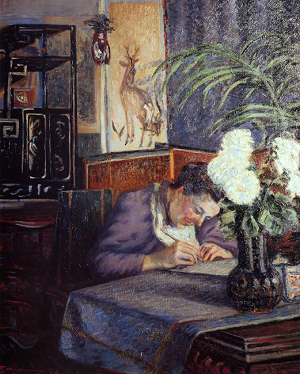 We hear a lot these days about the value of keeping a journal. It's interesting to note that journaling has been around for a very long time. It is nothing new and one of the earliest journal/diarists is thought to be the Roman emperor Marcus Aurelius (121AD - 180AD) who famously said, "When you arise in the morning, think of what a precious privilege it is to be alive - to breathe, to think, to enjoy, to love." First up, how does journaling differ from keeping a diary? A journal is a written record of your thoughts, feelings and experiences whereas a diary is more event-based, a record of events as they happen, or are going to happen. Diaries are often shared (in business, for example) but a journal is private and indeed keeping your journal safe and secret is integral to the value of keeping one. Such 'secrecy' (let's call it that for now) ensures that you feel comfortable and free to write everything you need to without fear of someone reading it. A key to journaling is honesty and truth, uninhibited by fears that you will be judged or criticised by the reactions of others. It's about self exploration, looking into that vastly intriguing and fascinating realm of 'what makes us tick'. And therein lies the greatest value: by journaling we learn more about ourselves, how we view the world and engage with it, what we see, hear, smell, taste and touch. We find out how we are with other people, places, objects, how we behave in certain situations and we can identify patterns of behaviour that are typical of us - and by identifying, we can change if we want to. We can see the triggers that 'set us off' whether that be into laughter, grief, anger or joy. Journaling often becomes a part of counseling or mental health work because it encourages us to look inwards in a positive, helpful and constructive way. With so much introspection going on, it's easy to fall into the trap of self-criticism and being hard on ourselves when journaling. Maybe we perceive that we 'behaved badly' that time, or we 'didn't do our best' on another occasion. Try to acknowledge and understand these feelings rather than criticise or condemn, and exercise self-compassion and kindness. Balance out the negative perceptions with the 'good', even if it's just a small thing, like, in the midst of it all, you brought in the neighbour's rubbish bin because he is elderly and struggles and he smiled and waved 'thank you' to you from the window as you wheeled it up the drive. It's easy to focus on all that is wrong. Try focussing on all that is right. Think of what you are grateful and thankful for, even if it's a little thing. When I was having chemotherapy for breast cancer, I wrote about being able to get down the drive to collect the post one day. That was the only thing I had energy for that day and I felt really good about it. It's not always about the heavy stuff. Creativity features large in our work as writers and our journal can provide us with a reliable and fun outlet for that. It's a place for jotting down observations, inventing stories, coming up with ideas as you allow your thoughts to ramble freely, sketching, drawing, decorating with pink flamingo stickers if you fancy, or photos that you like. There are no rules or expectations. It's a delightful free-for-all where anything goes and can be a great source for story ideas. I recommend hand writing your journal. We do so much on keyboards these days. Don't lose the ability to actually write with a pen on paper. Take your time. Find a quiet place and space in which to write your journal and find a spot to keep your journal where it will be safe.
0 Comments
 2024 is here. We've recovered from the festivities and over-indulgences, we're taking some quiet moments to rest, recover, recharge, and read in the garden. It's also a good time to get the creative engines running again. It's a stepwise process. Add some fuel ... turn the key ... spark the engine and 'give it some gas' as my Mom used to say when she was teaching me to drive ... and you're in motion, movin' on down the road. It's the same with our writing. Ideas are the fuel and you may have some stories in mind. The Christmas dinner that went haywrire after the cat brought a mouse into the house and began chewing it up under the festive table; that glorious day at the beach when the sky was the clearest blue, the wind a gentle caress, the sea water clear, calm, cold; the good times you shared with an old friend who'd come a long way to see you on New Year's Eve. Summertime abounds with stories, memories, thoughts, and reminiscences of childhood hollidays, a veritable treasure trove of ideas we can use for our writing. The new year can also be a time for contemplation, weaving together threads from the past, and thinking about the months ahead and how life's events can lead us down unknown paths. See where your thoughts and feelings take you in your writing. Allow yourself to be guided by your emotional and spiritual responses. I am looking forward to meeting a group of writers joining me for my Summer Writing Rev-Up in February here at The Writing Place. We'll spend the day sparking those ideas. We'll write, share, discuss, laugh, have a great time and get the creative engines in motion. If you missed out on this writing day, there will be more. To receive advance notice of upcoming workshops and events, please consider signing up for my newsletter.  The New Year is upon us, just like that. Many people I've spoken to recently say 2023 was one of the worst they can recall for several reasons: the climate (floods and destruction), the cost of living (high), wars in the world, the constant COVID resurgences ... and they're glad to see the back of it. At times 2023 seemed like a year without end, piling more and more upon us and now, all of a sudden, here we are in 2024. The New Year means summer holidays for us in the southern hemisphere, a time for relaxing, catching up with family and friends, and enjoying the beautiful places New Zealand offers. It's also when we make our resolutions, and I am going forward with a simple hope that 'this year will be better'. I'm setting some goals for my writing too because I know having a creative outlet can help me navigate the tough times. Over time I've come to understand that the goals I set myself have to be achieveable and specific. For example, in 2024 I will keep up my journal writing, a lifeline that has gotten me through some stormy waters, and the 2024 goal is to write it every day. 2023 saw me sitting down with my pen and notebook whenever I could and whilst much of that was due to 'life getting in the way', as they say, I didn't serve my journal well and so it didn't serve me well either. 2024 is an every day sit-down with my journal, at least 15 minutes a day, more if I can. 15 minutes and every day does feel achievable. I will also start on a couple of short story ideas I've had knocking around for a while and will do this during my regular writing hours (weekday mornings, between 8am and noon). Perhaps your goal is to write a book. Get specific. What is your book is about? Do you have a story to tell? If so, how are you going to tell it? Sort out the nuts and bolts. What writing schedule can you manage: will you write every day, every other day, once a week, what time of day? Where will you write: at the kitchen table, in the bath tub? How will you write: pen and paper, desktop computer, laptop? Do you think you may need help to write your book: what kind of help, who will help you and how? Ah! Enough questions to totally put you off! But don't be. Hang in there. Set a realistic goal and make it one you can achieve. There are few greater moments than seeing your writing reach its conclusion: a book you can hold in your hands, a story on a website, an e-book on Amazon. Glory, unfortunately, doesn't often drop from the heavens for writers - we work hard for it and in that effort comes true reward. You can do it. Make 2024 your writing year.  "Be a good steward of your gifts. Protect your time. Feed your inner life. Avoid too much noise. Read good books, have good sentences in your ears. Be by yourself as often as you can. Walk. Take the phone off the hook. Work regular hours." The above is a quote from US poet Jane Kenyon (1947 - 1995) who died of cancer at the age of 47, just when she was writing some of her best poetry. Her poems are resonant of a clear simplicity, each word chosen with care, loaded with meaning, and as her husband Donald Hall said about her work, '... her style is a glass of water - a 100-proof glass of water.' I keep this quote handy, especially in times like these when one never knows what the new day will bring. Here in New Zealand, it could be floods, as climate change brings us the freakiest weather I've ever seen, or it could be the near heart failure one experiences at the check out when the operator tallies up your meagre groceries and it comes to $200 for bare essentials, or perhaps yet another pitch from the politicians as they rally and scramble to impress us voters with their promises for the upcoming election. The quote reminds me that there is always the one constant - and that is our gifts as writers and creative people. Jane Kenyon enjoyed many of the things she mentions and I applaud her for that as I know it was most likely hard won. Today many of us cannot protect our creative time as well as we'd like to, with everything else that's going on but we can always be mindful of being a good steward of the precious gift of creativity. The flame might flicker, or get a little dim, but it's always there for you. Never doubt that. I've found in my daily work that nurturing the wee flame can be a saviour when the days are darkened. Many of the writers I've worked with over the last few months have found solace in their writing. Their projects have given them purpose, an outlet for emotions and feelings, a way of coping in a world that seems off kilter in a big way. So make time to 'feed your inner life' and ignore the phone. Read good books as the winter sets in, and take those walks, look up and look down at the trees, clouds and sky, and structure in that writing time ('work regular hours...') when you can be with your gift ... and shine.  How do we nurture that creative flicker into the flame needed to write imaginative stories? Setting the wheels in motion to create, allowing the mind to fly free ... as writers we all have different ways of reaching that place, zone, space, whatever you'd like to call it, that taps us into the creative well and flow. Having a time to write when you are at your creative best is a good start. Also, having a place to work where you feel content, whether that be the garden shed, the kitchen table, or a rented office space, is important too. And then there are the funny little rituals we use to ease ourselves into it ... Nuthin' wrong with those! Author Toni Morrison is quoted as saying, "I tell my students one of the most important things they need to know is when they are their best, creatively. They need to ask themselves, What does the ideal room look like? Is there music? Is there silence? Is there chaos outside or is there serenity outside? What do I need in order to release my imagination?” In this same piece from The Paris Review, she also tells us that "Writing before dawn began as a necessity. I had small children when I first began to write and I needed to use the time before they said, Mama—and that was always around five in the morning." And because she was in the habit of getting up early to work, this became her writing schedule after her children were grown. Toni has something to say about rituals too, those little activities we perform before we begin to write. Often we don't even know we're doing them and yet they are essential to 'getting started'. "I, at first, thought I didn’t have a ritual, but then I remembered that I always get up and make a cup of coffee while it is still dark—it must be dark—and then I drink the coffee and watch the light come... for me this ritual comprises my preparation to enter a space that I can only call nonsecular . . . Writers all devise ways to approach that place where they expect to make the contact, where they become the conduit, or where they engage in this mysterious process. For me, light is the signal in the transition. It’s not being in the light, it’s being there before it arrives. It enables me, in some sense." This mysterious process of creativity ... how does it happen for you? We often hear that writers are indulgent and dreamy creatures, staring into space for hours whilst seeking inspiration. Then we hear the other side where discipline is paramount - no time for dreaming and whiling the time away. Get to work, churn out those words and pages. All very well to say but it's not that easy. Like Toni Morrison, we need something to ease ourselves into that place where we can create - and it is a place unlike the every day. As she says, it is a space she defines as 'nonsecular' - religious or spiritual. I"ve often thought about creativity: where does it come from, how does it arrive, is it a God-given gift? I still don't know and no longer question. I feel blessed to have it - well, mostly although at one time in my life I felt it was a curse, a burden. Now it's like an old mate that I hook up with. We chat, catch up, brainstorm, drink coffee together. I connect with it, like hooking up to to an electric power point. I'm a 'Toni-Morrison-type'. I am at my best in the morning. After lunch, brain switch goes to off, time for a walk and other things. If I miss my morning slot, I propbably won't get much done that day. It's just the way it is. What's your best time of day to work? Before sunrise? Are you a nocturnal, thirving in the silent dark of a deep night? MIddle of the day over lunch? And what are your rituals? Perhaps a cup of something nice, or a meditation at your desk before beginning? It doesn't matter. The more eccentric and odd the better, I say! As long as whatever it is can link you into that creative flow. 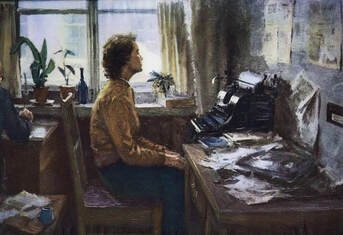 It came as no surprise to me to read this morning that, according to a survey undertaken by Remitly, (a financial services company for immigrants), being a writer is the second most popular 'dream job' of those surveyed. Remitly describes how they came up with this information: "To find out, we looked at global search data to discover the dream jobs of every country in the world. To achieve this we looked at searches for ‘how to be a police officer’ rather than ‘police officer jobs’ to show the amount of people in the ‘dreaming’ stage of different careers." I admit there is something attractive about the idea of being a writer although having been one for most of my life, the gloss wore off quite early on. I came to understand some tough realities, first and foremost that writing is hard work and takes discipline. Secondly, making money from it was going to be a challenge and taking it on for that reason alone would be a road to disappointment. I also had to learn that being rejected, time and again, was all part of the deal. So I suspect the people in the Remitly survey like the idea of being a writer and if they were confronted with the reality of that profession (i.e. being alone almost 90% of your working day, being paid about 5 cents per hour, no sleeping in or flouncing about, being at your desk on time to write for the set number of hours) they might choose the number one job on the list: a pilot. You have to be into it for the love of it. You have a passion that you cannot contain, a compulsion that drives you towards it, a willingness to take the knocks and keep going. I encourage people to write, to become writers. In these days of self publishing, you can put your work out there for all to see. You are not at the mercy of a managing editor who will send you a 'no thank you' rejection notice. Go on. Write and produce your book whether it be in hard copy or online. Enjoy that achievement. You may not make a lot of money but the rewards of your accomplishment may outweigh that in spades because you are a writer. You're not just dreaming about it. 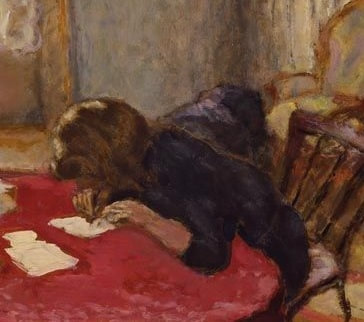 Will 2023 be the year you write your memoir? Maybe you'll finish the crime novel you started writing last year or begin a new project, perhaps a work of fiction, non fiction or life story. A fresh, new year spreads out before you. How will you make the best of it with your writing? It's time to make a start with new energy, ideas and inspiration. Best of intentions? Ah yes, often the way with a new year. We decide on a writing goal, take steps forward ... and then falter on the path. How do we make a start and how do we keep going? Inspiration and consistent work go hand in hand. Journalist Peter De Vries said, “I only write when I’m inspired, so I see to it that I’m inspired every morning at nine o’clock.” Author Barbara Kingsolver has some good advice about finding the right place to write and to write your truth without worrying about the expectations of others: "Close the door. Write with no one looking over your shoulder. Don’t try to figure out what other people want to hear from you; figure out what you have to say." Writing to a schedule that works in well with your day to day can provide the foundation for achieving your writing goals this year. It's often said that writing is 3% inspiration and 97% hard work and - I hate to tell you - this is very true. Set up your schedule, show up (even if you don't feel like it), and write. It's OK to have a ritual that leads you into your writing time. Mine is coffee and a piece of toast with butter and Morello cherry jam. I cannot begin without it. It is rumoured that poet and critic Edith Sitwell lay down in an open coffin before starting her writing day. The take away here is: do whatever you need to do to get the creative wheels turning. Keeping a journal can be a great way to build up discipline for writing this year. Sitting down with your journal at the end of each day can feel a bit like getting together with a good friend to chat about things. Journaling is also a very effective way to gather thoughts and ideas for writing projects and indeed the material within a journal can be used in memoir and life writing. If you need some guidance and help to get started, let's have a chat. I have some mentoring options up my sleeve that can help kick start your writing project. So let's begin. Get cracking. Tell that story. Make 2023 your breakout year! 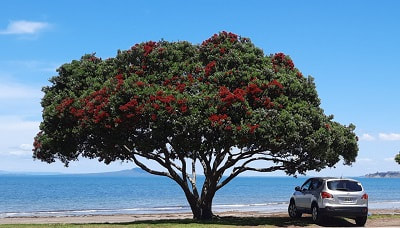 ... so it must be Christmas! It always lifts my spirits when I see the first bright red blossoms of our gorgeous native Pohutukawa trees, and we are blessed with a goodly number here in our little bay. We have some on the beachfront and of course they cling to the clifftops too, tenacious in the face of wind, weather and salt sea spray. A good friend of mine said that the Pohutukawas are all individuals. They bloom when they want, to the extent that they wish and I believe that's the case. Some will produce a profusion of colour one year, and a scant few blooms the next. Some are eager to show off now, others take their time. Walking by the trees you can here the industrious buzz of bees. The photo above is a fine example of the colours I associate with summer here in the north: the red and green of the trees, the blues and whites of the water, the beige of the sand, Rangitoto brooding green and volcanic in the distance, the sky a pale blue that forewarns us of the hot days to come, smudges of white cloud here and there. Ah yes. It's a welcome sight indeed. Summer with all its warmth, relaxation, and fun provides so much material for writing even if you're just lying back on your lounge chair, enjoying the view from wherever you are: have a go at writing your thoughts, what you see, hear, taste and smell. Writing down memories of summer can bring comfort and a smile when we find ourselves trudging through winter again with its rain and cold. Some of the most famous books ever written take place during summer (think The Great Gatsby): hot, sultry, steamy can provide the perfect setting for some intriguing storylines. Of course Christmas and New Year can offer up some great family stories - and we all have them: the outrageous aunt who insists on smoking cigars at Christmas dinner, the cat who chases a mouse up onto the table as Dad carves the ham, and waking up on New Year's Day hungover and lying in the old claw-foot bathtub with no idea how you got there. The events of recent years have certainly encouraged us to make the most of every moment, grab every piece of happiness that comes our way, and to work on changing those 'I should ...' statements to 'I will!' (Meaning, 'I will write that book I've been wanting to write for years ...') 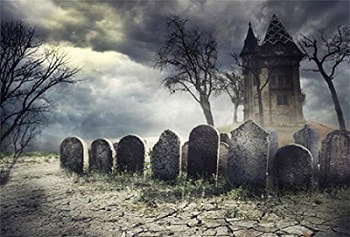 Ah yes, it's one of my favourite times of year - Halloween weekend! My love of the scary comes from Mom who delighted in ghastly things: books, movies, and, in the 'old days' (by this I mean 1960s!), gathering around the radio to listen to that classic series The Uninvited. Each episode began with the words that made my spine tingle: 'Have you heard them? Those fearful sounds in the dead of night? The muffled creak of a loosened board? The shuffling step of a ghostly figure? The eerie voice of The Uninvited?' Man, let me tell you, I still recall listening to that intro and the 30-minute ghost story, sitting with Mom in the dark by the fire on a winter's night (she insisted we turn all the lights off). The unmentionable creatures of the darkness breathed their foul breath against our safe circle of orange firelight as we leaned in close to the radio. I was too scared to venture down the hall to my bedroom afterwards. Mom used to tell a story about her earliest experience with a horror movie. It was The Mummy with Boris Karloff (made in 1932). Mom was just a little kid and the movie scared her so badly she hid under the cinema seat but saw enough from her place of safety to know that terror was delicious and she was hooked. This story taught me two things: watch horror movies from a safe place (ideally at home, on the couch, cushions piled all around to ward off the evil, back to the wall so nothing can creep up behind) and take cover when needed (watching the really horrible bits through the mesh of a baseball cap). My sister and I had our initiation into horror as kids. Mom and Dad took us to the drive-in movies when we lived in Seattle. I specifically remember the title of one that we viewed tucked up under blankets in our pyjamas one night at the drive-in: Atom Age Vampire. Mom's love of horror and all things ghostly was lifelong and we watched more movies together than I can ever count. She was viewing scary DVDs almost up to the day she passed away. Most of the writers I work with are not writing horror and indeed, the majority aren't fond of the genre. I can totally understand but there is an insatiable market for horror and suspense and if you're thinking of giving it a go, take inspiration from Halloween. Get into the spirit of it. There are lots of scary movies on TV right now, plenty of ads for horror books and stories - and you may well have a fresh and dynamic idea that'll be the next horror blockbuster. I've seen plenty of movies with monsters however the ones that spook me the most are those where the everyday becomes horrid. Stephen King is probably The Master at this type of story: people are going about their everyday lives and then something happens that turns that on its head. Take It where a little boy is floating his paper boat down a roadside gutter in the rain and can't catch his vessel before it goes down into a culvert. When he looks down into the drain what does he see? A clown. Our story begins ... If you've always wanted to have a go at horror, now's the time. Here's an an idea to get you started: you go down to the mailbox to collect the post and there's an envelope addressed to you in a hand that looks very familiar. No, it couldn't be. Aunt Mavis died ten years ago. You open the envelope and see that the handwriting is definitely Aunt Mavis' and she's writing to tell you .... yeah I know, it's a bit lame, that's why I watch and read horror and don't write it myself! But you can see where I'm going with this: take the everyday activity, weave in something peculiar that has the potential to morph into something that'll scare the pants off people. 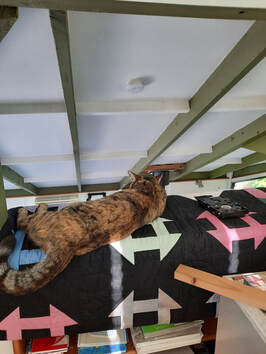 The neighbour's cats make themselves at home. Often in my home. That's the way with my two feline friends Poppy and Mr. Boy who live next door. I've written about them since they were kittens and now they're a couple of fully grown adventurers who prowl around our bush-clad properties here in Arkles Bay. They visit me most every day, either at home or here at The Writing Place. Often Miss Poppy is at my front door in the early mornings, waiting to accompany me down the stairs to work. Cats just walk on in. They know no boundaries. They are intensely curious, inspecting anything that has changed since the day before when they visited. They sniff, look, pat with their paws and they're alert and aware of what's going on around them. They don't miss much. I often wonder how it would be if we behaved like that, sauntering through someone's open door, wandering about, poking our heads into cupboards, jumping onto the kitchen bench to drink water out of the sink, sniffing the rubbish bins, then, after we've investigated every private space, settling in for a good sleep on a nice handmade quilt, a priceless family heirloom. As writers we can learn a lot from cats. Follow their lead. I wouldn't advise actually walking into someone's house but we can do so in our minds and imaginations. Be a cat. Enter the scene. Let's say we're conversational cats, able to understand talk between people. What are they saying? Cats observe. What do these people look like? What can our sensitive eyes see, our superman-ears hear and our whiskers and nose detect? Cats are intuitive. What can we sense? Is something momentous about to happen? What is the mood: argumentative with a fight looming, lots of laughter and a party in progress, sadness with crying and wailing, or a joyous reunion? Cats make excellent narrators and lots of books have been written from a cat-ly perspective. One only needs to Google 'books where cats are narrators' and plenty of examples come up. I've often told Poppy she should write a book as she is quite the rambler, well known for her forays into houses on our streets. However I do feel that she is an honourable holder of secrets (unlike some writers) and prefers to keep it that way. 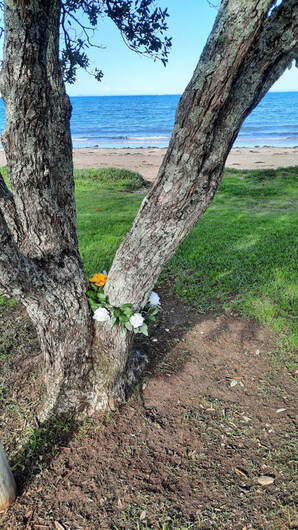 Winter is well and truly here. Those cold, clear days - we've had some of those - and the windy wet ones too. Early July and we're past the winter solstice so it's full steam ahead towards summer. I was walking at our beach the other afternoon and happened across this: someone had wrapped a small wreath of colourful flowers ( artificial but no matter) around the trunk of one of the pohutukawas we have along the beachfront. A few years back someone took to a couple of these gorgeous native trees with a chainsaw and cut them down. The council planted a couple of new ones. Over time, I noticed that one was struggling, withering and dying and on my walk I saw that it had been removed. There's just the empty space there now and it occurred to me that the wreath may have been placed as a remembrance of the tree that didn't make it, or perhaps it had been placed to comfort the well established pohutukawa beside it that had, I'm sure, done its best to nurture and encourage its fledgling neighbour, bearing sad witness to its slow but steady decline and eventual removal. Or maybe it had been placed there to brighten our days with a bit of colour. Whatever the reason - and there could have been many - I was moved by this simple gesture someone had taken. When we do this in our writing, the effect can be just as powerful. Our story - the tree trunk, let's say - may need just a slight touch, a hint of colour, a bit of magic, so the reader will go, 'Ah! Yes!', perhaps be taken to a place of emotional memory or to a time of life long forgotten and now recalled by the writer's skill. The smallest thing can be the most powerful and evocative. 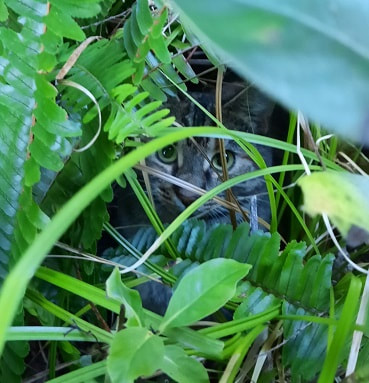 I haven't blogged in some time because I've been hunkered down and hiding out. My mate Poppy from next door has the right idea. She secludes herself amongst the foliage and the bush, only peeping out when she cares to, or can bear to. I don't think I'm alone in this coping strategy as we continue to deal with waves of COVID, war in Europe, Chinese encroachment into our Pacific patch, gas well over $3 a litre, not to mention the cost of food which sees five essential items in my trolley (and I don't mean beer) generate a bill of $130+. Not that I've become a hermit or anything, it's more that I've 'retired' for a bit, taken myself out of the mainstream as I, like so many others, try to get my head around all of this. Call it breathing room, or making head space, or whatever you like, but call it unusual because it isn't often I feel anxious in this way. What a world we are seeing. Oh yes I forgot climate change which might see my one-block-away-from-the-beach property become launch-my-kayak-from-the-end-of-the-driveway place in a few years. I haven't felt like writing, to be honest with you, because in spite of being a writer, words are failing me these days. I simply don't know how to put these feelings into words. So it just seems far easier to read books or watch TV. When the world becomes too tough to endure, we can turn to introspection and the inner world of the imagination, and it is rich there. Here is territory we know but yet is there to be explored, discovered anew, and mined for the jewels that make our stories. These troubled times are encouraging so many people to write: so far this year I've completed mentoring projects with four writers (all now promoting their published books), have another who is nearing publication and one who is working in the draft stage. I can find words to say how very proud I am of these talented writers. They have worked incredibly hard with discipline and determination and I wish them every success with their published works. I know I will write more about these challenging days, of course I will. All in good time. 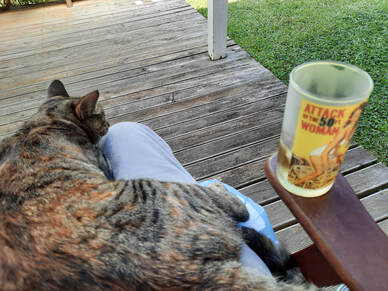 Watching the nightly news is almost too much for me these days. I'll sit down and watch three horror movies end on end so I'm pretty tough but the daily news at 6pm has me beat. It's one adversity after another: the ever increasing COVID numbers here in New Zealand as Omicron flexes its muscle, the continual hammering of the Prime Minister and the government, the widespread protests creating social divisions to a degree that is profound and disturbing, the rising cost of food, the startling escalation in petrol costs and mortgage interest rates, and now the war developing in Europe as Russia pushes its way into the Ukraine. How much more can we handle right now? I was feeling overwhelmed this week. My journal pages were bursting, overloaded with words trying to describe emotions and thoughts that are all over the show. It's the uncertainty that is so hard to deal with. I don't do well with it and it reminds me of the cancer treatments I had where we hoped for the best but didn't really know for sure. Past traumas come back to haunt. So what can we do to keep ourselves well? I remember a fellow manager I worked with in the air express industry when I was a manager there myself. It was high stress every day back then - flights delayed by weather or mechanical failure, packages routed to Auckland ending up in Egypt, couriers calling in sick - and we were having coffee together and she said, 'I only worry about those things over which I have control.' That worked kind of well in air express and I sometimes apply this to my every day life: why worry about something that I haven't any hope of controlling, like petrol prices? Can I control that? No, I cannot - but I can find a way to manage how it affects me. The other maxim I remember was from counselling sessions some years ago and this piece of advice has served me well ever since: the concept of 'structure and distraction' to get through tough times. The structure could be a daily routine (e.g. work, or a routine to the day) and the distractions could be a nice walk on the beach, reading a book, a visit with a friend - those little things that we work into the structure of a day. Yesterday my structure was cleaning the house, a bit of gardening and my daily swim at the beach. The distraction was sitting in a comfy chair out on the deck with a shot of whiskey in my Attack of the 50ft Woman glass, some jazz playing in the background, and the neighbour's cat Miss Poppy on my lap. Sitting in this way gave my soul some much-needed solace for an hour or two, a reprieve from the worry, an oasis of calm. We take our comforts where we can these days. 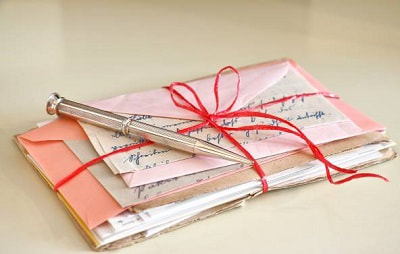 It's Valentine's Day, the occasion when we express our love and feelings for our nearest and dearest, or send a message of endearment to someone we would like to capture in our lasso of love. These days it's easy to communicate our passions on Facebook or Instagram, send an e-card with bursting love bubbles and blossoming roses, or Zoom our beloved for a face to face tête-à-tête. But what about that way of communicating which now seems out of date and, dare I say it, old fashioned? Actually confessing our love on a piece of paper or in a card, with a pen? I am feeling old when I write this because writing letters (and I think back to my early school days when we used a fountain pen (I remember mine was a red Osmiroid that I got for my birthday one year) with a nib sucking up ink from a small bottle) was what we did before emails came along ... gosh, I may be ancient, but I'm proud because my generation has evolved well, adapting to the internet and computers and all ... Do we even know how to write a Valentine's Day love letter, and is there anything better than receiving an actual letter or card on this special day? Here are some tips to help you write your love letter - and I do mean WRITE with a pen and paper, no e-cards! 1. When we talk or post on Facebook, we don't often filter what we want to express: when you sit down to write with pen and paper, you can take time to figure out what you'd really like to say. 2. The act of engaging feelings and thoughts with your 'writing-with-pen-hand-on-paper' can help you delve deeper into your heart: that connection between thought and actual words on a page has long been the tool of writers to tap into the expressive vein. 3. When we write using pen and paper, we can express feelings that may be hard to verbalise in the presence of the other person. 4. Before you begin writing, spend some time jotting down thoughts, things you would like to say. When it comes to writing, you can then edit and hone to express more clearly what you want your beloved to read. 5. Adding some special and cherished memories you shared together can add colour and vibrancy to your letter. For example, you could write about the day you met. And we don't need to wait until Valentine's Day to write a love letter. We can write letters and send cards through the post all year long, and the subject of our letter doesn't necessarily have to be our partner or love interest. Love doesn't just mean romantic inclination. It can mean gratitude, thankfulness, the depth of an enduring friendship, a tribute to parents (alive or deceased), our children, even a beloved pet. There are no rules for writing love letters - make it up to suit yourself - and goodness knows, with the world the way it is right now, we need all the love we can get. 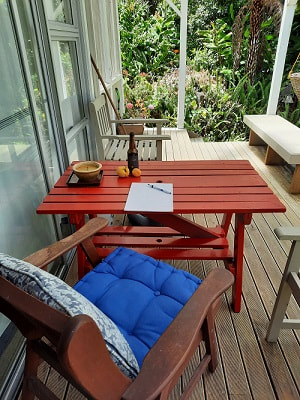 It was Virginia Woolf who insisted that, ''A woman must have money and a room of her own if she is to write fiction." Or if she is to write anything, I think. Money is nice but most writers probably don't have the luxury of enough cash in the bank to be able to write full time. There are part time jobs to top up the coffers or writing hours squeezed in between full time gigs. However, most of us will have a room of our own, or a place, where we can write. I have a few places, depending on the season, and pictured here is my outdoor red picnic table with a notepad, a citronella candle in a clay pot, two peaches from the tree in the garden and an empty bottle of beer left by a visiting friend. Our summer weather has been pretty hot as we begin the new year and so sitting outside on the shaded deck is a mighty fine set up. I can see the garden and snippets of the sea through the trees, hear the birds making their raucous calls, enjoy visits from the neighbour's cats (whom you have met before, Miss Poppy and Mr. Boy), and work on my writing. The picnic table was here when I bought the house many years ago, a very fine relic of parties past and time enjoyed by the young family who owned the property before me. It was in need of paint and so fire-engine red seemed appropriate and I cannot believe how well the paint has held up over all these years. Wish I could say the same for myself. Sitting outside to write can be distracting because there are so many things to look at, to listen to, to sense: a gust of cooling breeze that brings the sea-salt smell up from the beach, the frantic tuis as they dart and dash amongst the trees like jet fighter planes, the neighbour's dog upset by the postman's cycle, the thump of bass from the kids down the road and their garage band. But isn't that what is needed for writing, when one is dreaming on a hot summer afternoon, letting the animal of the imagination off it's leash to wander, explore, delight and learn? Where is your writing place this summer? What do you see, hear and smell while you're there?  Is 2022 the year you'll finally tackle that romance novel you've been wanting to write, or get cracking on the family history? Maybe the memoir about the adventure you had traveling in Nepal or living on the island of Corfu in the '60s? If there is one thing the COVID pandemic has taught us, it could be, 'Get on with it!' We can never know what is around the corner. Time is precious and it's finite. If you don't have a writing project in mind, how about journaling? 'I have nothing to write about' is a common roadblock for daily journal keeping but even the mundane can be interesting. If all you're doing right now is sitting in a chair on the deck avoiding the heat, write about the chair. How long have you had it? Where did it come from? Who sat in that chair during previous summers? I like to sit on a solid old wooden deckchair that belonged to Mom. The arms still bear the ring marks of multiple gin and tonics she used to perch there while she looked out at the sea. Perhaps you have a favourite pillow that goes with the chair. Was it given to you by someone or did you pick it up at Bed Bath and Beyond? What is special about it? The cushion I use in Mom's old chair is soft and faded blue with an unusual pattern on the material that looks like devils' heads. (Come on, really?). Deciding to keep a daily journal - or every other day or even once a week - is a mighty fine writing activity to have on your radar this year, and it isn't a huge undertaking like creating a novel which, let's face it, can seem daunting and even downright impossible during the blissful, enervating days of summer when energy and brainpower is not really a priority. Setting small goals, taking little steps, can produce great things over time. So what's on my radar this year? My usual journaling, as I've done since the age of 17 (with a few gaps here and there), and working with other writers to help them reach their writing goals. As for my own personal writing, I'm exploring the horror/suspense genre. I suppose you could say the COVID pandemic has heightened my awareness of how ordinary, daily life, can be turned on its head within days by the most unexpected of events.  Not far from my house there's a small reserve with this lovely, cool green tree right in the middle. It sits bare and forlorn all winter and then, without you even noticing, it begins to unfurl these gorgeous lime-coloured leaves. The tree affords a delightfully cool place to catch one's breath on a hot day. I took a photo of it the other day because I suddenly noticed it had all its leaves! On my walk today I saw my tree had some company. A lady was sitting on her folding chair with a thermos of tea and a scone, scribbling in a notebook. She looked up as I was passing (keeping my socially acceptable distance) and she said without any encouragement from me (apart from the smile I gave her), 'I'm writing a novel and it'll be a best seller! Imagine! At my age!' I guessed she was probably in her 80s although one can never tell with certainty. She waved her notebook in my direction and said, 'It's a sex book.' Way to go, I thought. 'Tell me more,' I said. She said she had always had a novel in her and this was to be the romance story she had been thinking about for years. Her husband passed away last year and so now she had time to write. Her aim was to develop a pen name that befitted the romance genre and she planned to submit her manuscript to a romance novel publisher in England she had her eye on. I told her I had once had a go at writing romance fiction under the pen name of Amber Forest. I figured out pretty quickly it wasn't my genre. My new friend wagged her pen at me and said, 'We all have lives of romance. You just have to let it bubble to the surface. Life is romantic! All you need to do is listen and write down what you hear.' She said she liked writing under the tree because it was such a pleasant place to be on a warm day but it also inspired her as she'd had some of her 'best romantic experiences' under trees and in peoples' gardens. I told her I was a writer and we had a conversation about that and then she paused for a moment, took a sip of her tea from a china cup festooned with roses and said, 'You're never too old to write a best seller you know. Look at Grandma Moses. She started painting her folk art at the age of 78. Her stuff is worth a fortune now.' So true.  I don't know about you but I've had so many toasters in my life I've lost count. My work-day breakfast routine includes a piece of toast with jam or honey and a cup of coffee, and if I don't have a toaster that works, well, you can imagine the rest. This kick-start to the day has to be right. I'd purchased yet another toaster during lockdown. The predecessor was off its nut, burning the bread to cinders no matter the setting. So this one arrives by courier, all shiny and flash looking and I unpacked it with glee, all ready to plug in and enjoy. Lockdown has meant many things but in this case, it meant I could not peruse the toasters in the shop so had to look at them online and pick. I thought I'd done pretty well. So off we go. Toast in, slide down, coffee ready. Boom. Well, a loud 'thunk' that struck a chord of familiarity for me. Said new toaster tripped the electrical failsafe for the whole house. No power anywhere. Fortunately I knew how to remedy this with a reset of the switch. Can you imagine the exasperation: coffee ready to go, butter and jam standing by, hungry writer ready to start work, a new, glamourous but defective toaster smugly proud of its ability to destroy it all. What to do? Dig out the old pyromaniac toaster from the garage and put up with it. I've had cheap toasters, top of the range toasters and it doesn't seem to make any difference. They have all bitten the crumbs after what seems to me to be an inordinately short time. Now I think this short-circuiting toaster is reflective of what's going on for me right now. Our city of Auckland has been pinned down by the arms and legs by COVID restrictions for about four months and my circuits are overloaded. This evil minded toaster sent me over the edge. It doesn't take much to trip my failsafe. I think a lot of us are short-circuiting right now. I just want a toaster that works. I want a nice piece of toast with my coffee without having to worry about the toaster blowing up the house. Is that too much to ask? 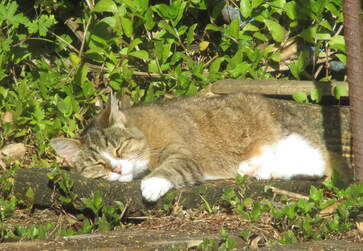 I've written before about my cat Betsy - indeed she had her own journal for a while. She was with me for 21 years. That's a lifetime, you could say. She died last December and I still miss her. You know how it is. Sometimes you see a flash of grey-brown in the garden and your brain in its instinctive wisdom goes, 'It's Betsy-cat' and then it rationalises, 'No, she's dead - that's a young blackbird you're seeing.' Or you'll be sitting watching TV at night and you'll hear what sounds like a plaintive meow from the front door. That would've been Betsy wanting to come inside. Maybe some feet pitter-pattering on the tin roof. Betsy loved going up there to enjoy the expansive view and moonlight. It's been said that our deceased loved ones visit us in dreams. This is when they can drop in and say hi, let us know they're doing OK. I am not sure about this but I do know I've dreamt about Mom lots of times and I nearly always wake up feeling reassured but in pain because I miss her so much. Despite the pain, there's a knowledge that she is fine, enjoying wherever she is, probably hanging out with her old friends over gin and tonics. Now, I don't mean any disrespect here but imagining her in this way brings me comfort. Sometimes I see her as the woman she was before Parkinson's stole so much from her - vibrant, funny, always a smile - and at other times she is debilitated and a bit wobbly but she is unfailingly happy and often, in these dreams, I am taking her shopping, something she and I loved to do together. Last night I had a dream about Betsy-cat. In the many months since her death, I've thought of her a million times but she hasn't come to me in my dreams. In this dream I was walking up the driveway and she was lying on the warm brick steps, enjoying the sun as she loved to do. In the dream, I was so astonished to see her (because I knew she had passed away) that I exclaimed, 'Betsy! I'm so pleased to see you!' and she lifted her head in that relaxed way she had, as if to say, 'Oh, it's you, OK' and then she got up and came towards me. 'Hello sweetheart,' I said as I gave her some loving pats and tickles around her ears. Then, once again as was her habit, she allowed this affection for just so long and then turned away to return to her warm spot on the brick steps. By this time in my dream, I was crying, saying 'I miss you Betsy...'. I woke up then to find I hadn't shed any real tears on my pillow but my throat was thick with them. Was Betsy telling me she was OK, lounging about in the warmth of wherever she is, letting me know all was well? I don't know. What I do know is I miss my old mate. We had a great run together - 21 years is a long time and what a gift it was to have her for so long - and even though she's no longer hanging out in the garden or on the roof, she'll always reside in my heart, my special Betsy-girl mate. 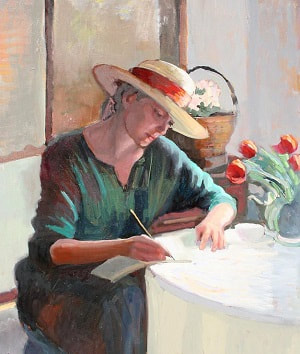 How do you write a book? One word at a time, or, on a good day, several words. It can seem like an impossible task, this book-writing gig. You have an idea, you can see the end result (your book sitting in the shop, people flocking to purchase, the movie deal knocking at your door), the fame and glory, cash rolling in ... fabulous! But how do you get there? I hate to tell you that the movie deal and tsunami of cash may be a bit of a challenge - but aim high, I say - and the reality of writing a book is a mission that needs to be undertaken with a commitment as solid as the Great Wall of China. Many books begin with a flurry only to languish in desk drawers or share a box in the attic with last year's Christmas decorations, or reside deep and lonely in a hard drive somewhere. Having an idea for your book is the first step; having a plan to reach the endgame (publication, movie rights, adoration) is the next, and then, well, once again I'm sorry to tell you, you have to write the jolly thing. Going the distance with your writing will take discipline. Just like athletes training for the Olympics, they won't get there unless they have a plan, work hard, and stay with it. Of course you can hire someone to write it for you or mentor you while you write it (someone like me...) or you can set yourself a writing goal and make a writing plan you can live with and that's important because if it's unrealistic, you may not be able to stick to it and use this as an excuse not to do it. Now comes the 'word by word' bit. That's how you write a book. Some days the words flow, other days they don't, but those words add up, they grow, layer on layer, page by page. Some words in that first draft may be outrageous, embarrassing, totally wrong, but that's what first drafts are for, building content, page after page, chapter after chapter, giving you content to hone, craft and polish . Focusing word by word can take away that overwhelming feeling of 'the whole', the panic and desperation we sometimes feel when we visualise the flashy book on the shelf but cannot see how in the heck we will ever get there. The whole is the sum of its parts. Those parts are the chapters. The chapters are the words. Go for it.  What do we do when we are locked down for months at home? We garden. Gardening has kept me sane most days, and we've had some glorious weather in which to work outside. Spring is definitely here and summer is dangled tantalizingly in front of us although we are not sure at this point how much enjoyment of the traditional kiwi summer break we will have. There is no bright horizon when it comes to COVID so we take each day as it comes. I looked at my last post and couldn't believe it was from the 31st of August. What? Way over a month ago? Time seems to be standing still right now. Auckland has been in various levels of COVID lockdown since that post in August. Right now we are in Level 3 with perks, those being we can meet outside, two households, no more than ten people, for a barbecue. Oh yes, and we cannot use the toilet in someone's house. Not allowed to gather inside, anywhere. This has been somewhat problematic when some public toilets have been closed due to COVID. We are encased in our city with closed borders north and south. Special documentation is needed to leave or enter Auckland. Face masks are the order of the day and it's dueling trolleys at the supermarket as we attempt to get in, hunt and gather and get out as fast as possible. The rest of New Zealand has more freedoms but no rambling about too much please or gathering in huge numbers. It's tough right now. It's hard to stay motivated. A number of writers I work with are having trouble with their projects. Lockdown seemed like the perfect opportunity to get stuck in and finish their books. Not so. Lockdown lethargy settles on us like a fine dust, dampening down, stifling thought, and it's easier to sit in front of the TV and watch box sets of Dexter. I've felt that way too. I do my daily work but when it comes to my creative self - like writing my Blogs - well, you can see how well that's going. The spring colours seem especially vibrant this year or maybe it is that way because our senses are seeking out the brightness, the fragrances, the loveliness of nature whilst we scramble about and try to contain the daily virus cases. Such a longing for colour, the solace digging about in the dirt can bring, the delight at seeing the accomplishment in the garden at a time when it feels like, as a city, we take one step forward and four backwards. It lifts the spirits. 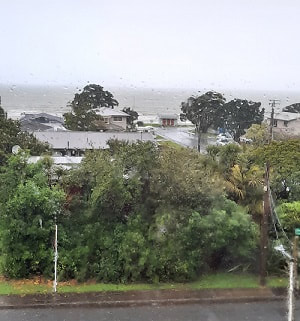 This morning is stormy - here's the view from my office window. Rain, wind, wild seas and a neighbourhood shut in not only by the weather but by another two weeks of Level 4 lockdown in Auckland. Not much sleep was had last night as lightning flashed, thunder rocked and rolled and the rain barreled down on the old tin roof. We were warned about this level continuation by our Prime Minister, Jacinda Ardern, a few days ago and it was confirmed yesterday. Even so, having a heads-up beforehand didn't really do much to lessen the feelings of .. what? I have a number of those feelings this morning as I look out the window, feeling very much isolated not only by the storm, up here in my working space, but also by the knowledge that at 11.59pm tonight, our city will be cut off from the south with police at the southern boundary, and it is likely that on Thursday this week, at 11.59pm, we will be cut off from the north, another border patrol in place to prevent people coming and going unless they have specials exemptions for work or to provide essential services. We shall be soldiering on alone. I have to say though, that our Prime Minister delivered this news in a way that was both firm and yet empathetic. She said Auckland had been doing much of the 'heavy lifting' for the whole country, which is true, as we are the port of entry into the country and as such, the city is always on high alert, and now Aucklanders are having to bear up so the rest of the country can begin to resume normal activities, albeit with heavy restrictions still in place. Facing another two weeks of isolation is daunting, it feels emotional this morning in a way it didn't yesterday. That prospect, plus this wild weather, looking out my window and seeing no one, apart from a few signs of life (a bunch of sodden washing on a clothes line across the street, a rubbish bin blown into the empty street by the gale) I feel as if I could be the only person here. I was brightened just a moment ago, receiving an email from our blues band leader, with a song he'd like us to listen to and learn whilst in this home-alone period, a good old Bo Diddley rocker, one that will be great for when we can be together again. 'The COOLEST groove' he said, 'especially for bass (him) and drums (me).' And that's pretty good advice too, for right now. Stay cool and stay groovy. It'll see us through.  The COVID Delta variant has arrived in New Zealand with a hiss and a roar, or would it be better to say, like in insidious interloper, now well accustomed to finding its way into populations all over the world with its well-honed and crafty viral skills. Once again New Zealand is in the highest level lockdown and we are watching the world go by from the windows of our homes. Not that my home and view looks anything like this from master Henri Matisse but the gorgeous colours gave me some cheer this morning and I hope they do the same for you. I was listening to some news this morning and the District Mayor of Westland, a true-blue West Coast man, put it best. He was saying this Delta variant is dangerous, we need to take heed and abide by the current Level Four restrictions in place for the whole of New Zealand. "This has the potential to really bite us in the bum," he said, to which the reporter replied, "And we don't want that." We surely do not. We've heard so much political-speak this week, lengthy orations about the virus and this new mutation, and that is fine and we need the information but in terms of understanding what could happen if we don't play ball and stay at home, the Mayor's words say it all in a way that we can all really take to heart. So we find ourselves in this lockdown place again and most seem to be handling it OK, despite the ever-increasing list of locations of interest which seems to be creeping further south and north every day. So far, on our little peninsula here, we are OK but who knows who amongst has may have visited the dumpling place down town, or the Sky City Casino, or the BP station in Waiouru, and then come home with an unwanted passenger. It can really get to you, if you let this train of thought leave the station, gaining momentum as it travels down the tracks until you're so anxious and beside yourself, you begin to wonder if its actually safe to walk on the beach, even with a gale blowing (as it has been the last few days). Is 'it' traveling on the wind? Is that person I just passed someone who was at the Glenfield McDonald's this week at the time an infectious person was? As my mother would say, 'Balderdash! Get out there and have a walk!' OK. I am walking, I have been to the grocery store (well done Silverdale Pak n Save for managing shoppers in such an efficient and caring way), and I have spoken with neighbours, albeit from a distance. Even though this virus wants to bite us in the bum, we can't resign our bums and just give in. Of course, abide by the rules, but keep your pecker up (i.e. chin) and carry on as we navigate our way through this challenging time. And don't forget to write about it. This is an historical time and your thoughts about living through a pandemic will not only be fascinating reading for future generations, but getting it down on paper or your computer is good therapy.  If there was ever a time when writing could help us heal from trauma and challenge, this could be it. Even though COVID 19 and it's repercussions have become very familiar to us, the anxiety continues. Will it spread, what about this horrid Delta variant that is so much worse, when will I get my vaccine, why are we letting sick mariners bring their boat to within coo-ee of our largest city ... it is relentless, every day, every night on the news there is more. 'Healing writing' helps us make sense of why we feel the way we do. It encourages us to explore our emotions and thoughts and is not so much about what we write but how we write it. The way we write it can vary: in a journal, as a poem, a song, a prose story. Doesn't matter. You choose, because the writing you do, is just for you, no one else. That's part of the healing. You aren't writing to please or impress anyone, you're not writing to sell or publicise. You are writing for you, to express your emotions and to make sense of life. Healing writing, also known as 'expressive writing', can take the form of a story with a beginning, middle and end. Tell the events and link your feelings to them. For example, say you attended a large gathering, perhaps a birthday party, last weekend. Lots of people. The scene was happy, band was playing, and you were having a great time until you heard whispers that someone at the party had recently returned from New South Wales and may have been at a COVID 'place of interest' in Sydney. The realisation that you may have been exposed to the virus occurred to you when the band started playing the Van Halen song 'Runnin' with the Devil'. So: the event was the song, what was the feeling that went with it? The first important thing about healing writing is to let it all hang out and get it out, no matter how it comes. Don't worry about spelling, grammar and all that horseradish. Set the timer for ten minutes and keep moving, don't stop. Sentences may be full or fragmentary, or you might just have thoughts scattering the page like buckshot. That's all OK. The second is to focus on details: for example, delve into that moment at the party when you heard the song and the COVID scary news. What were you doing? Maybe you were standing in your uncomfortable red stiletto shoes that you bought specially for more than you earn in a month, holding a cold glass of a sweet cocktail that had run over the side and your fingers were sticky ... you get the picture? The third is 'the big reveal': what have you learned about yourself? Not to buy too-expensive shoes? Not to drink sickly-sweet cocktails? Not to go to any more big parties for a while? Probably of most importance would be your reaction to the COVID fright at the party: how did you respond (fear, anger, denial, feeling foolish because you spent so much money on those damn shoes and the party has turned into a horror show, or booze-inspired bravado?), and why did you respond in that way? Identifying why you responded the way you did helps you make sense of it, learn from it, and find a way forward. Writing about it can also help us forgive ourselves. We're only human after all. After you've written for ten minutes, you may find that your blood pressure has lowered, you're more relaxed and in control, your mind unburdened, less emotionally charged and overwhelmed. You feel better. Now I'm not saying that expressive writing cures all ills, not at all, and sometimes we need to access more appropriate help to support us as we move through a tough time. I do know that this type of writing can improve overall wellbeing and help settle the anxious mind and spirit. There's something about translating an emotional experience into words. It can turn a negative into a positive. Try writing for ten or fifteen minutes for three or four days in a row: set aside the time, say 4pm to 4.15pm or whatever works, stick with it, see what happens. 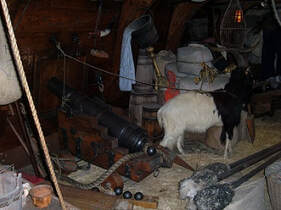 I've been a bit 'under the weather' lately. My Mom used to say this when we were sick and my current under the weather episode would have fascinated her. Mom was intrigued by all things medical and would have made a great physician. She'd look at me and say, 'Jane you have the most unusual ailments.' I looked up the 'under the weather' saying before writing this post today as I was curious about its origins. Apparently it's a nautical saying from the days of sailing ships. If a sailor was unwell, he went below decks to be protected from the weather, hence the term 'under the weather'. I am not sure that being below decks on an old sailing ship would have been that beneficial, considering a sailor might've been sharing the space with a canon, canon balls and a goat or two. My 'under the weather' has been a series of unusual events with an as yet undetermined cause. Suffice to say I've been crook for a while now: off my food (unusual), unable to touch a beer (catastrophic) and even had to bail on a couple of drumming gigs (unheard of). One thing I can say is, it's not COVID-19. Phew. I was telling a friend about the litany of health horrors with which I have been afflicted and she said, 'It's a bit like a whodunnit. There are several suspects who've had their hand in the cookie jar and it's a case now of finding out which one is actually responsible.' Mom adored whodunnits, the more horrid and convoluted the better, and she would agree wholeheartedly with my friend. A series of tests and scans has eliminated some potential suspects but we are still to find the culprit, the one causing the malaise. We're all hyper aware of our health now as the world continues to wrestle with this persistent and doggedly determined COVID-19 virus, one that seems to morph and change to ensure its survival and stay one step ahead of us. We can certainly empathise with those who have endured it and of course have heartfelt sadness for those who have died from it. All of this reminds me of two things: no matter how far we have come with medical treatments and research, the body can still hold mysteries that baffle medical experts, and the second, its can often be a process of elimination to find 'whodunnit'. Oh yes and there's a third. Whenever we were under the weather, Mom would remind us of this: 'Your health is your most valuable asset. Do all you can to protect and care for it.' |
Archives
January 2024
|